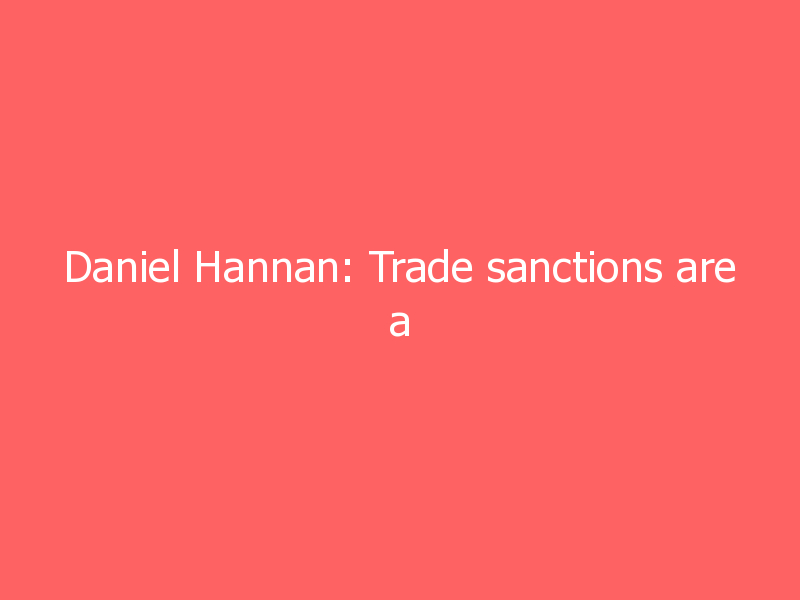Daniel Hannan: Trade sanctions are a counterproductive foreign policy tool – which play into the hands of oppressive regimes
Lord Hannan of Kingsclere is a Conservative Life peer, writer and columnist. He was a Conservative MEP from 1999 to 2020, and is now President of the Initiative for Free Trade.
What can one country practically do to halt crimes against humanity in another? The answer is far from obvious. At one end of the scale, it might decide that it has an absolute duty to intervene against genocide, and that the only choice is therefore to invade the offending state, with or without a coalition of allies, halt the killings or be defeated in the attempt. At the other, it might conclude that there is nothing much it can do beyond moving a condemnatory resolution at the United Nations, offering sanctuary to refugees and possibly withdrawing its ambassador.
Obviously, there is a huge spectrum between those two approaches. But there is surprisingly little discussion of what the optimum point on that spectrum is – the point at which exercising proportionate pressure is likeliest to result in a policy change in the other country. Perhaps inevitably in an age of performative anger, some commentators are more interested in signalling their horror at human rights abuses than in pondering the most effective way to tackle them.
The very first vote I cast in the House of Lords (electronically, under the current lockdown rules) was on this issue. An amendment moved by the crossbench peer, Lord Alton, would effectively have allowed British courts to determine whether any country trading with us was guilty of genocide and, if so, to trigger economic sanctions.
No one has ever accused Alton, a former Lib Dem MP, of performative anger. He is a decent and thoughtful man who manages – a rare thing in politics – to be moral without being moralistic. His amendment has attracted supporters from every party in both chambers – most of them, too, actuated by good and sincere motives. But, in the end, it seems to me that their proposed remedy is misplaced.
Ministers argue that issues of this kind ought not to be referred to courts. The question of whether another country is committing such atrocities within its borders as to constitute crimes against humanity should be one for our elected government. If, as would surely sometimes happen, our judges ruled that there was insufficient evidence to make a determination, the offending regime might seize on that judgment as vindication: “Britain has cleared us of genocide”.
All this is true, as far as it goes. We should be very careful about drawing judges into political questions – and drawing them into issues of foreign policy would be quite a step. But it seems to me that there is a more fundamental objection to the proposal. Put simply, trade sanctions are a terrible foreign policy tool. They are not so much useless as counterproductive, serving to hurt ordinary people in the other country as well as your own while propping up the regime of which you disapprove.
At the very least, trade sanctions – including the suspension of a free trade agreement, which we might consider the softest trade sanction – push people in the targeted state towards their leaders. One reason why Communism survived in Cuba when it fell in most of the world was that American sanctions had created a siege mentality. The embargo allowed Fidel Castro to tell his countrymen that their poverty was caused, not by Marxist economics, but by the yanqui blockade.
Vladimir Putin knows how to exploit the same phenomenon, triggering constant conflicts which are primarily intended, not to absorb bits of Georgia or Ukraine, but to foment confrontation with the West, so keeping Russians in a mood of defensive and angry patriotism – precisely the state of mind that makes them likeliest to rally to Putin.
More than this, though, economic sanctions create lucrative opportunities for elites within the countries at which they are aimed. In an open and competitive market, with low barriers to entry, prices fall – to general benefit. The more restricted or distorted a market becomes, the more opportunities are created for monopolists, especially those who are politically connected. States subject to sanctions – Iran, Russia, Venezuela – form a nexus, doing deals with each other which allow a few brokers to get very rich while doing nothing for the general population.
To see what I mean, think back to the oil-for-food regime that operated during the UN sanctions against Saddam Hussein. Notionally designed to allow food and humanitarian supplies into Iraq, it became a racket, allowing favoured Ba’athists and their allies in other countries to make a fortune.
If trade sanctions don’t work, what does? As I said at the start, that is not an easy question. But it surely makes sense to target sanctions at the guilty, something Western countries have become much more adept at doing over the past 20 years. Micro-sanctions vary in severity: travel bans, asset seizures, arrest warrants – possibly even, in extremis, Eichmann-style judicial kidnappings. As a general proposition, though, keyhole surgery must be more effective than hacking blindly with a cleaver.
I was struck, during that first House of Lords debate, by how many people still see trade in essentially mercantilist terms – as a favour to be bestowed rather than as a growth strategy. That fundamental misunderstanding distorted the coverage of the EU-UK trade talks. (“Why”, asked commentators “should the EU grant us access to their markets?” – as though doing so were an act of kindness.) But, more seriously, it distorts our approach to unfriendly regimes.
We often stumble into trade sanctions because of the most dangerous sequence in politics: “Something must be done; here’s something; let’s do it”. In fact, commercial restrictions take from the many to give to the few – and the tyrants know it.
Originally found on Conservative Home Read More








